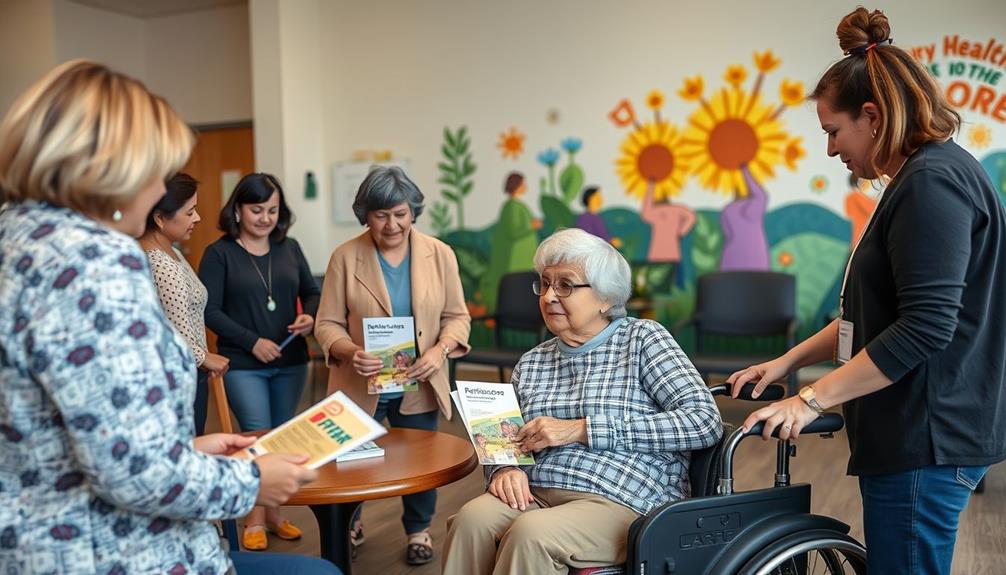Maneuvering the healthcare system for your loved one with Parkinson's means being their proactive advocate. Start by building a strong care team, including a neurologist, physical therapists, and social workers. Keep communication open among team members and prioritize scheduling appointments carefully. Prepare for each visit by documenting concerns and questions. Regularly update your loved one's care team about their symptoms and medication responses. Don't forget to tap into community resources for additional support. Taking these steps can greatly enhance their care and wellbeing, and there's even more valuable information to explore on effectively managing this journey.
Key Takeaways
- Engage a neurologist or movement disorder specialist as the primary healthcare provider for tailored Parkinson's disease management.
- Create a centralized calendar for scheduling and tracking all medical appointments to avoid conflicts and ensure attendance.
- Prepare for healthcare visits by compiling questions, medical history, and documenting key information to maximize appointment effectiveness.
- Maintain open communication with the care team for regular updates on treatment options and to discuss any changes in the patient's condition.
- Access community resources like support groups and local chapters for additional assistance and social connections related to Parkinson's disease.
Understanding Parkinson's Disease

Understanding Parkinson's disease is essential for anyone impacted by it, whether directly or through a loved one. This progressive neurodegenerative disorder primarily affects movement and is characterized by motor symptoms like tremors, rigidity, and slowed movements.
When someone is diagnosed with Parkinson's, it often begins with subtle changes, such as persistent hand tremors or stiffness in muscles, which can gradually worsen over time. Financial considerations for elderly care, including assisted living expenses, are also important as the progression of the disease may necessitate additional support.
The disease stems from the death of dopamine-producing nerve cells in the midbrain, leading to decreased dopamine levels critical for movement and coordination. Each person's experience with Parkinson's can vary greatly, making early intervention and education essential.
By understanding the nature of the motor symptoms, you can better support your loved one in managing their condition. Additionally, engaging with support groups can provide valuable resources and a network of individuals facing similar challenges.
These groups foster a sense of community and can enhance the quality of life for both patients and caregivers. By staying informed and connected, you empower yourself and your loved ones to navigate the complexities of Parkinson's disease together.
Building Your Care Team

Building a care team for someone with Parkinson's starts with identifying key healthcare providers, like a neurologist or movement disorder specialist.
It's important to include professionals who can help manage financial planning and potential investment strategies, especially considering the unique challenges that may arise.
You'll want to coordinate care efforts among various professionals to guarantee all aspects of the disease are addressed.
Enhancing communication strategies within this team can lead to better support and improved quality of life for your loved one.
Additionally, be aware of avoiding scams that could impact financial security during this journey.
Identifying Key Healthcare Providers
Creating a strong care team is essential for effectively managing Parkinson's Disease. By identifying key healthcare providers, you can guarantee your loved one receives thorough support tailored to their needs.
Understanding the importance of proper budgeting can also alleviate some financial stress during this journey, allowing you to focus on care and support. Here are three critical roles to contemplate:
- Neurologist or Movement Disorder Specialist: These experts are fundamental as they provide specialized knowledge and treatment options for Parkinson's, helping to manage symptoms effectively.
- Physical and Occupational Therapists: Physical therapists can design customized exercise programs to improve mobility, balance, and strength, reducing the risk of falls. Occupational therapists focus on adapting daily tasks and modifying home environments, enhancing your loved one's independence and overall quality of life.
- Social Worker: A social worker can help navigate insurance, connect you with community resources, and offer counseling services that support emotional well-being for both your loved one and your family.
Incorporating these healthcare providers into your care team can greatly improve the management of Parkinson's Disease, guaranteeing your loved one receives the best possible support and resources throughout their journey.
Additionally, a well-structured budget plan can help manage expenses related to healthcare services and treatments.
Coordinating Care Efforts
As you commence on the journey of managing Parkinson's Disease for your loved one, coordinating care efforts is fundamental to guarantee they receive extensive support. Building a all-encompassing care team is essential, including neurologists, movement disorder specialists, physical therapists, occupational therapists, and social workers.
Engaging a movement disorder specialist as the primary care provider is significant since they possess specialized knowledge critical for effectively managing Parkinson's. Understanding the importance of key domains of development can also provide insights into how different therapeutic approaches might benefit your loved one's emotional and cognitive growth.
Regular communication among team members enhances continuity of care, allowing for tailored interventions that evolve with your loved one's symptoms. Ascertain the care team is well-informed about their medical history, current medications, and specific challenges to facilitate effective treatment planning and management strategies.
Utilizing resources from organizations like the Parkinson's Foundation can help you find healthcare professionals who specialize in Parkinson's care. As an advocate for your loved one, you'll play a key role in making sure their needs are met.
Enhancing Communication Strategies
Effective communication is the cornerstone of a well-functioning care team for someone with Parkinson's disease. When you actively engage with your care partners, you enhance their ability to provide the best support.
Regular updates on health conditions are essential, much like the importance of routine health checks for pets, as they help in identifying changes that may require immediate attention.
Here are three strategies to improve communication with your care team:
- Prepare for Healthcare Visits: Compile essential medical history, medication lists, and specific questions before appointments. This preparation guarantees that you cover all critical concerns and fosters a productive dialogue.
- Utilize Resources: Leverage organizations like the Parkinson's Foundation to find qualified specialists and support services tailored to your loved one's needs. They can offer guidance and resources that enhance communication with healthcare professionals.
- Regular Updates: Keep all team members informed about changes in your loved one's condition, symptoms, or reactions to treatments. Regular discussions and updates facilitate coordinated care and improve overall management.
Coordinating Medical Care

Coordinating medical care for your loved one with Parkinson's requires careful scheduling and clear communication. By organizing appointments and ensuring everyone on the care team is informed, you can create a supportive environment that addresses all their needs. It’s essential to keep a detailed calendar of not only doctor visits but also medication schedules, therapy sessions, and any other important health-related events. Consistency in medication timing can have a significant impact on symptom management, so staying on top of routines is crucial. Additionally, looking into **medication tips for Parkinson’s caregivers** can provide valuable insight into how to administer medications effectively, monitor side effects, and coordinate with healthcare professionals to ensure optimal care.
It may also be beneficial to reflect on the emotional support required during this time, as managing a chronic illness like Parkinson's can take a significant toll on both the patient and their family. Understanding the emotional impact of life changes can help you better support your loved one.
Let's explore some effective strategies to streamline appointment scheduling and enhance care team communication.
Appointment Scheduling Strategies
When it comes to managing care for a loved one with Parkinson's, having a well-organized approach to appointment scheduling can make all the difference. As a care partner, you can streamline the process and help your loved one navigate their healthcare journey effectively. Here are three strategies to take into account:
1. Centralized Calendar: Create a shared calendar to track all medical appointments. This helps avoid conflicts and guarantees you're always prepared for upcoming visits.
Additionally, incorporating tools that enhance security and privacy can help safeguard sensitive health information, making the scheduling process smoother and more secure, especially when dealing with security systems.
2. Utilize Online Portals: Many healthcare providers offer online patient portals. Use these to schedule appointments, access test results, and communicate with the care team easily.
3. Seek Recommendations: When looking for specialists, ask your primary care physician or local Parkinson's support groups for recommendations. This can lead you to expert care near you.
Additionally, prepare for appointments by consolidating questions and concerns ahead of time. Bring a notepad or a digital device to document important information during the visit.
Following up with the care team afterward guarantees that any treatment plans are clear and actionable, providing the best support for your loved one's Parkinson's diagnosis.
Effective Care Team Communication
How can you assure that your loved one with Parkinson's receives the best possible care? Effective communication with the healthcare team is key. First, establish a clear line of communication with all members involved in your loved one's care. This guarantees everyone understands the treatment plans and can address any concerns promptly.
Regular updates from healthcare providers will enhance your understanding of treatment options, empowering you to advocate for your loved one more effectively. Additionally, embracing a mindset of curiosity and happiness can enhance your interactions, fostering a more collaborative environment with the healthcare team.
Attending medical appointments together provides emotional support and fosters better communication. It allows you to ask relevant questions and clarify any uncertainties directly with the healthcare team.
Furthermore, participating in care planning discussions encourages collaboration, leading to a tailored approach for managing symptoms and overall health.
Keeping detailed documentation of appointments, medications, and symptom changes is also essential. This record not only aids in continuity of care but also facilitates effective communication among the entire healthcare team.
Communicating With Family

Effective communication with family is essential for creating a supportive environment for loved ones with Parkinson's disease. Open dialogue fosters understanding and reduces stress, benefiting everyone involved.
Here are three key strategies to enhance communication, which can be as important as navigating financial options for your loved one's future:
- Hold Regular Family Meetings: These gatherings can help family members express shared feelings and concerns, allowing you to develop collective coping strategies for managing the disease.
- Encourage Sharing: Invite your loved one to share their experiences and emotions. This strengthens familial bonds and promotes the emotional support they need during challenging times.
- Practice Active Listening: Make it a priority to listen to your loved one's thoughts and preferences. This guarantees their needs and wishes are respected in care planning.
Additionally, maintaining consistent check-ins—whether through phone calls, video chats, or in-person visits—can greatly reduce feelings of isolation for both the patient and family members.
Accessing Community Resources

Accessing community resources can greatly enhance the support network for your loved one with Parkinson's disease. Local PD chapters often offer valuable resources like support groups and educational workshops that can empower both you and your loved one.
Engaging with organizations like the Michael J. Fox Foundation helps connect families to fundamental services, advocacy opportunities, and informative materials. Additionally, there are increasing opportunities for individuals to utilize technology in managing care, such as employing AI cybersecurity jobs to protect sensitive health information.
Participating in community events, such as Moving Day walks, is another excellent way to foster connections with others affected by PD. These activities not only promote physical activity but also provide a sense of belonging, which is essential for emotional well-being.
Additionally, many communities provide adaptive exercise classes specifically designed for individuals with PD. These classes enhance physical health while also encouraging social interaction, making them an important part of a thorough care plan.
Don't overlook the power of technology; utilizing online platforms and helplines like 1-800-4PD-INFO can guide you to local resources tailored to your loved one's specific needs.
Practicing Self-Care

Caring for a loved one with Parkinson's disease can be incredibly rewarding, but it's essential to remember that your well-being matters too.
Neglecting self-care can lead to caregiver burnout, making it harder for you to provide the support they need. By prioritizing your mental health, you can enhance your resilience and continue being an effective caregiver.
Here are three self-care strategies you can implement:
- Set Boundaries: Recognize your limits and know when to take a step back. This helps prevent compassion fatigue and emotional exhaustion.
- Engage in Hobbies: Dedicate time to activities you love, whether it's reading, gardening, or exercising. This rejuvenation is important for maintaining your mental health.
- Practice Mindfulness: Incorporate relaxation techniques, such as meditation or yoga, into your routine. These practices can greatly boost your emotional well-being.
Frequently Asked Questions
What Is the Average Age of Death for Someone With Parkinson's?
The average age of death for someone with Parkinson's typically aligns with the general population, around 78 to 82 years. However, complications can greatly affect life expectancy, varying based on individual health and disease progression.
What Should You Not Say to Someone With Parkinson's Disease?
You might think it's helpful to compare struggles, but it's not. Avoid minimizing their experiences, making assumptions about their abilities, or offering unsolicited advice. Focus instead on listening and providing genuine support.
What Is the Most Common Cause of Death in Parkinson's Patients?
The most common cause of death in Parkinson's patients is complications like pneumonia, often due to severe dysphagia. Falls also contribute greatly, leading to serious injuries that can be fatal. Understanding these risks is essential.
How to Support a Family Member With Parkinson's?
"Many hands make light work." To support your family member with Parkinson's, offer practical help, maintain regular communication, encourage community involvement, and stay engaged in their care. Your presence can make a significant difference.
Conclusion
Steering through the healthcare system for a loved one with Parkinson's can feel overwhelming, but you're not alone. With about 1 million people in the U.S. living with this condition, your advocacy makes a real difference. By building a strong care team and communicating effectively, you can guarantee they receive the best support possible. Remember to prioritize your own well-being too, as caring for yourself enables you to be a better advocate for your loved one.









